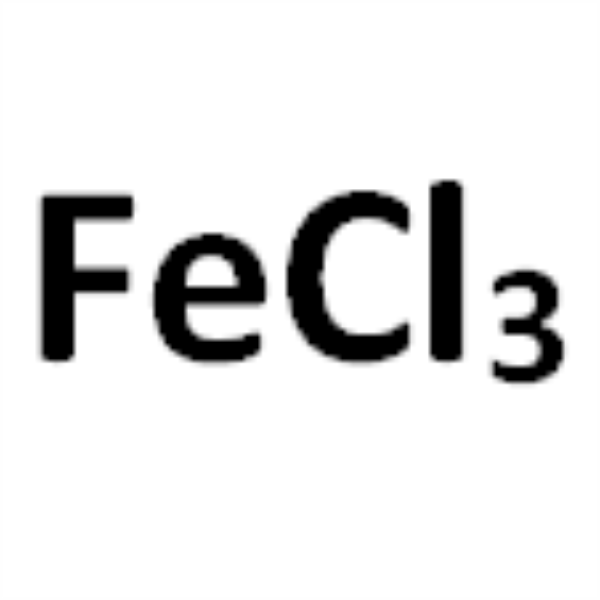Chemical Properties:
Package: 25kg/PP woven bag, 50kg/bag, 50kg/Drum, or according to customer's requirement Storage Condition: Store in sealed containers at cool and dry place; Protect from light and moistureShanghai Ruifu Chemical Co., Ltd. is the leading manufacturer and supplier of Iron(III) Chloride (CAS: 7705-08-0) with high quality. We can provide COA, worldwide delivery, small and bulk quantities available. If you are interested in this product, please send detailed information includes CAS number, product name, quantity to us. Please contact: alvin@ruifuchem.com| Item | Specifications |
| Appearance | Brown to Black Powder or Crystals |
| Purity (FeCl3) | ≥97.5% (Argentmetric Titration) |
| Iron (Fe) | 33.9~34.9% (Titration by Na2S2O3) |
| Water by Karl Fischer | ≤1.00% |
| Insoluble Matter | ≤1.00% |
| Ferrous Chloride (FeCl2) | ≤2.00% |
| Copper (Cu) | ≤1000 ppm |
| Lead (Pb) | ≤200 ppm |
| Manganese (Mn) | ≤3000 ppm |
| Arsenic (As) | ≤10 ppm |
| Zinc (Zn) | ≤1000 ppm |
| Solubility in HCl | Brown to Black, Clear, 50mg/ml Pass |
| ICP | Confirms Iron (Fe) Components Confirmed |
| X-Ray Diffraction | Conforms to Structure |
| Test Standard | Enterprise Standard |
Description:
Specifications:
Package & Storage:
| Chemical Name | Iron(III) Chloride |
| Synonyms | Iron Chloride; Iron(III) Chloride Anhydrous; Ferric Chloride; Ferric Chloride Anhydrous |
| CAS Number | 7705-08-0 |
| CAT Number | RF-PI2267 |
| Stock Status | In Stock, Production Capacity 300 MT/Month |
| Molecular Formula | FeCl3 |
| Molecular Weight | 162.2 |
| Melting Point | 304℃(lit.) |
| Boiling Point | 316℃ |
| Density | 2.804 g/cm3 |
| Sensitive | Moisture Sensitive. Hygroscopic |
| Stability | Stable. Very Sensitive to Moisture. Incompatible with Strong Oxidizing Agents; Forms Explosive Mixtures with Sodium, Potassium. Hygroscopic. |
| Brand | Ruifu Chemical |
Advantages:
FAQ:
Application:
Iron(III) Chloride Anhydrous (CAS: 7705-08-0) is a mild oxidizing agent and participates in various carbon-carbon-bond forming reactions. On crystallization with water, it forms hydrates. It has strong humidity-absorbability, and can produce its dihydrate and hexahydrate. Easy soluble in water, ethanol, acetone, also in liquid sulfur dioxide, ethylamine, aniline; but insoluble in glycerol, or phosphorus trichloride. Its aqueous solution is acidic.Especially for water-treatment in industries, corrosive for electronic printed board, chlorinating agent in metallurgical industry, oxidant and mordant in dye industry, and catalyst, oxidant, and chlorinating agent in organic synthesis, and also for making ferric salt, pigment as raw material. Iron(III) Chloride is mainly used for the engraving etching of electronic circuit board or purifies drink water and treats waste water. Iron(III) Chloride is also used to make other iron salts, oxidant, catalyst, mordant and ink. Mainly used as a water purifier for drinking water and wastewater treatment and purification of precipitation agent. Printing and dyeing industry used as an oxidant and mordant for dyeing indigo dye. Organic synthesis of dichloroethane production of catalyst. Chlorination leaching agent for silver ore and copper ore. An etching agent for photographic and printing plates. A raw material for the manufacture of iron salts such as iron phosphate, pharmaceuticals, pigments and inks. Infiltration of its solution into building concrete can increase building strength, corrosion resistance and prevent water seepage. Used in electronic industry circuit board and fluorescent digital cylinder production. A coagulant for the recovery of glycerin from the waste liquid of soap production, Iron(III) Chloride has been used in the synthesis of Au/Fe nanoparticles. It has been used as oxidative etching agent during the preparation of platinum nanostructures. The vapor-phase co-reductions with other metal halides by hydrogen results in finely divided intermetallics with applications as structural materials or compounds with useful thermoelectric, magnetic, and oxidation-resitance properties. Iron(III) Chloride is also employed as a Lewis acid for catalysing reactions such as chlorination of aromatic compounds and Friedel-Crafts reaction of aromatics. It is also used as a leaching agent in chloride hydrometallurgy.


